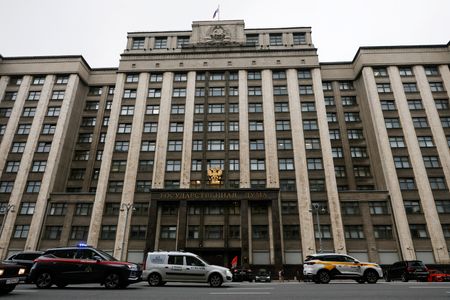By Alexander Marrow
(Reuters) – Russians will face fines if they search online for “extremist” content under a new law that tightens censorship and could have sweeping ramifications for digital privacy and the fate of WhatsApp in the country.
The legislation, approved on Tuesday by parliament’s lower house, the State Duma, has drawn criticism from some pro-government figures, as well as opposition activists. Opponents say the fines it prescribes, of up to 5,000 roubles ($63.82), could open the door to tougher charges and penalties.
The Ministry of Justice’s list of extremist materials stretches to more than 500 pages. Entities banned in Russia for carrying out “extremist activities” include late Kremlin critic Alexei Navalny’s Anti-Corruption Fund, the “international LGBT movement” and U.S. tech giant Meta Platforms.
On Friday, lawmakers who regulate the IT sector said Meta-owned WhatsApp should prepare to leave the Russian market as it was likely to be added to a list of restricted software.
The new legislation targets people who knowingly search for extremist materials online, including through virtual private networks (VPN) that millions of people across Russia use to bypass censorship and access banned content.
“This bill concerns a very narrow group of people, who look for extremist content because they themselves are already one step away from extremism,” Sergei Boyarsky, head of the Duma’s information technology committee, told Duma TV.
ONLINE SELF-CENSORSHIP
Digital Development Minister Maksut Shadaev said law enforcement would have to prove that users intended to view extremist materials and that merely accessing platforms would not be penalised.
It was not immediately clear how the authorities would determine intent in an online search. The lack of clarity has left many feeling uneasy.
Yekaterina Mizulina, head of Russia’s League for a Safe Internet, a body founded with the authorities’ support, criticised the law’s “vague wording” and warned the law could spark a wave of fraud, blackmail and extortion.
“For now, the law applies only to the search for extremist materials, but there is no guarantee,” Mizulina wrote on Telegram. “The list could be expanded in a couple of days.”
Sarkis Darbinyan, founder of digital rights group Roskomsvoboda, said he expected people to start unsubscribing from certain channels and deleting apps.
“I think this is one of the main tasks that has been set: to create fear, to create such uncertainty so as to increase the level of self-censorship among the Russian internet audience,” Darbinyan told Reuters.
Shadaev told the Duma that fines on the Russian population were preferable to banning platforms like WhatsApp and Google in Russia.
Moscow has long sought to establish what it calls digital sovereignty by promoting home-grown services, including a new state-backed messaging app, MAX, but many people across Russia still rely on foreign platforms.
POLITICAL PROTEST
Opposition politician Boris Nadezhdin, who tried unsuccessfully to run against Vladimir Putin in a presidential election last year, led a protest outside the Duma on Tuesday and promised to continue protesting the bill’s passage through the upper house of parliament, the Federation Council, before it becomes law on September 1.
“These amendments have caused a level of resistance in Russian society that has not been seen for a long time,” Nadezhdin said, pointing to the surprisingly high number of lawmakers voting against the proposed legislation in the Duma, which rarely sees serious dissent.
The law was approved with 68% of the vote. There were 67 votes against the legislation, or 14.9%, and 22 abstentions.
($1 = 78.3500 roubles)
(Reporting by Alexander Marrow in London and Moscow newsroom, Editing by Mark Trevelyan)










